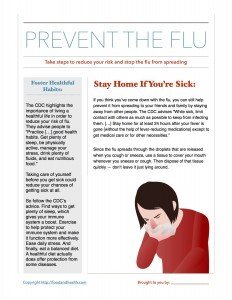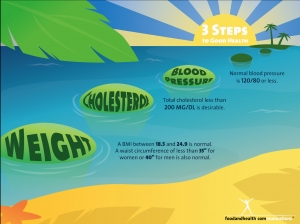2 More Flu Prevention Tips
Here are two more tips to help your clients prevent the flu! Flu Prevention Tip #1: Foster Healthful HabitsThe Centers for Disease Control and Prevention (CDC) highlight the importance of living a healthful life in order to reduce your risk of flu. They advise people to "Practice [...] good health habits. Get plenty of sleep, be physically active, manage your stress, drink plenty of fluids, and eat nutritious food."Taking care of yourself before you get sick will actually reduce your chances of getting sick at all.So follow the CDC's advice. Find ways to adjust your schedule so that you get plenty of sleep. Sleep gives your immune system a boost and helps it function more effectively (source). Exercise is important too. After all, according to the Los Angeles County Department of Public Health, "Exercise has the capacity to protect and even enhance the immune response."Managing stress is also vital to flu prevention. One study explains "analyses were consistent with a pattern in which feelings of stress and loss of sleep become locked into a feed-forward circuit that ultimately diminishes the humoral immune response. These findings may shed light on the mechanisms through which stress increase[s] vulnerability to infectious disease" (source). In other words, people who are stressed out and missing sleep weaken their immune system and leave themselves more vulnerable to infectious diseases like the flu.A healthful diet can further help your body have all the tools it needs to fight off the flu. Eating foods that are rich in vitamins, minerals, and other nutrients can strengthen the immune system and boost general health. Think lots of fruits and vegetables, alongside some whole grains, lean protein, and low-fat dairy foods.Be proactive and reduce your risk of the flu today!
Flu Prevention Tip #1: Foster Healthful HabitsThe Centers for Disease Control and Prevention (CDC) highlight the importance of living a healthful life in order to reduce your risk of flu. They advise people to "Practice [...] good health habits. Get plenty of sleep, be physically active, manage your stress, drink plenty of fluids, and eat nutritious food."Taking care of yourself before you get sick will actually reduce your chances of getting sick at all.So follow the CDC's advice. Find ways to adjust your schedule so that you get plenty of sleep. Sleep gives your immune system a boost and helps it function more effectively (source). Exercise is important too. After all, according to the Los Angeles County Department of Public Health, "Exercise has the capacity to protect and even enhance the immune response."Managing stress is also vital to flu prevention. One study explains "analyses were consistent with a pattern in which feelings of stress and loss of sleep become locked into a feed-forward circuit that ultimately diminishes the humoral immune response. These findings may shed light on the mechanisms through which stress increase[s] vulnerability to infectious disease" (source). In other words, people who are stressed out and missing sleep weaken their immune system and leave themselves more vulnerable to infectious diseases like the flu.A healthful diet can further help your body have all the tools it needs to fight off the flu. Eating foods that are rich in vitamins, minerals, and other nutrients can strengthen the immune system and boost general health. Think lots of fruits and vegetables, alongside some whole grains, lean protein, and low-fat dairy foods.Be proactive and reduce your risk of the flu today! Flu Prevention Tip #2: If You're Sick, Stay Home!If you think you've come down with the flu, you can still help prevent it from spreading to your friends and family by staying away from other people. The CDC advises "While sick, limit contact with others as much as possible to keep from infecting them. [...] Stay home for at least 24 hours after your fever is gone [without the help of fever-reducing medications] except to get medical care or for other necessities."Since the flu spreads through the droplets that are released when you cough or sneeze, use a tissue to cover your mouth whenever you sneeze or cough. Then dispose of that tissue quickly -- don't leave it just lying around.And there you have it! Two more tips to help your clients this flu season. To share this research with them, get a copy of this new PDF handout, which covers the highlights of today's post...
Flu Prevention Tip #2: If You're Sick, Stay Home!If you think you've come down with the flu, you can still help prevent it from spreading to your friends and family by staying away from other people. The CDC advises "While sick, limit contact with others as much as possible to keep from infecting them. [...] Stay home for at least 24 hours after your fever is gone [without the help of fever-reducing medications] except to get medical care or for other necessities."Since the flu spreads through the droplets that are released when you cough or sneeze, use a tissue to cover your mouth whenever you sneeze or cough. Then dispose of that tissue quickly -- don't leave it just lying around.And there you have it! Two more tips to help your clients this flu season. To share this research with them, get a copy of this new PDF handout, which covers the highlights of today's post... And don't miss these amazing health-boosting resources from the Nutrition Education Store! We're here to help you look your very best, right now...
And don't miss these amazing health-boosting resources from the Nutrition Education Store! We're here to help you look your very best, right now...




